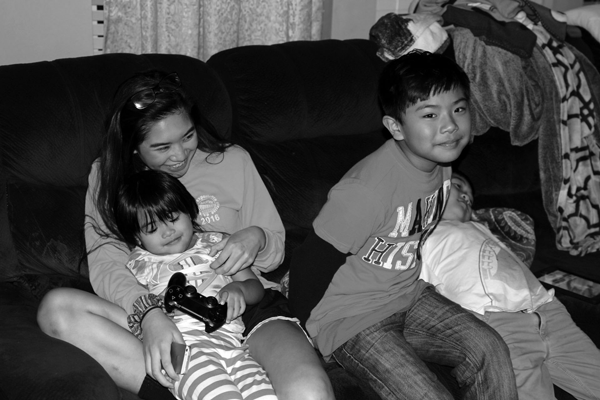Near and Dear To My Heart
1. Very personally and emotionally important to one.
Families across the globe vary tremendously–more so than most of us consider in our daily spectrum of thoughts. While there are hundreds of cultural norms, many in our own community fail to recognize the same range of diversity within families in this town.
Senior Zachary Tholen has an uncommon home situation. Last year, his family made the decision to move to California, but amidst the move, Tholen’s dad was working on a project for work that could not be halted until this May. Tholen had the choice to stay in Antioch with his dad for one year or go with his sister and his mom.
“I wanted to start a new adventure,” Tholen said. “I needed to do something else, somewhere else.”
After deciding to move to California with his mom and sister, Tholen had the opportunity to return to Antioch temporarily with his dad. Needless to say, Tholen decided to come back.
“I thought it would be good for me, help me grow as a person,” Tholen said. “But, I just wanted to be in a familiar place.”
However, the absence of his mom and sister hasn’t gone unnoticed; the most obvious downfall of living without his mom and sister is loneliness. Still, he connects with his mom and his sister over text frequently.
“Just because we’re on separate sides of the country doesn’t mean that we aren’t close,” Tholen said. “This whole process has actually made my sister and I closer.”
But loneliness isn’t the only pitfall. In the absence of his mom, Tholen has had to become more independent.
”I had to start cooking by myself and taking care of myself and doing things that I didn’t do when my mom was here,” Tholen said.
No matter where he is though, Tholen acknowledges the idea that the grass is always greener on the other side.
“If I’m here, I’ll want to be in California, and if I’m in California, I’ll want to be here,” Tholen said. “There are advantages and disadvantages to both places; you just have to do what’s best for you.”
On the other hand, senior Bryan Ortiz is a second generation immigrant from Mexico. His parents came from Tejupilco, Mexico as teenagers.
“They came to find a better life,” Ortiz said. Though they lived good lives in Mexico, the economic state in Mexico is much different than here, and in America there is more opportunity to build an economically sound lifestyle.
Decades later, his parents have built their way up to self-employment. They own a restaurant, and Ortiz and his two siblings help out frequently. However, this isn’t the only unique thing about being a second generation immigrant. While his parents are fluent in Spanish, Ortiz doesn’t speak much Spanish at home. Yet, he knows enough to understand and reply fluently.
Furthermore, tradition is big in Mexican culture, and it has carried over to Ortiz through his parents.They follow national holidays, such as the Day of the Dead and Mexican Independence Day. But, Ortiz’s family is spread out so much so that he doesn’t see anyone outside of his immediate family often.
“[We have] an uncle in Chicago, an aunt in Chicago, an uncle in Milwaukee and some [family members] in Texas and California,” Ortiz said. “The rest are in the hometown [in Mexico.]”
Ortiz wishes that he hadn’t lost part of his culture and connection with family in his parents’ transition from Mexico to America, but some things cannot be changed. Even so, Ortiz is an advocate for equal opportunity.
“[My parents] tell me to be hardworking and not [judgemental], but sensitive of others because they came from [less],” Ortiz said.
And while some may view working extra as a disadvantage, Ortiz doesn’t. He believes that the increased opportunity in this country and the greater chance of receiving a higher education pales in comparison to any other challenges and disadvantages he has and will face in the future.
On the contrary, senior Dylan Parker is someone who comes from an All-American family. He classifies himself as a white, suburban, middle class, male student who participates in American activities.
For example, the holidays are spent with family, and family isn’t far.
“We celebrate Easter, Christmas, Thanksgiving, Fourth of July,” Parker said. “My grandparents live by Lakes Community High School, and my cousins live in Mchenry, so I see them a lot.”
Unlike the Ortiz’s, Parker has the ability to gather with his family on more occasions than just the major holidays. Parker’s standard week consists of watching sports games, going to school, attending business club, volunteering and working.
“If it’s football season, we just watch football the whole day, every Sunday,” Parker said. “Saturdays are [for] soccer and college football.”
However, there are setbacks of being a middle class, suburban, white kid that most do not recognize, and one of these is receiving financial aid for college.
“If an underprivileged kid [and I] go to the same school, [he/she’ll get] a lot more money and [I’ll] get less,” Parker said. “Obviously, I [will] have to pay more and he might end up getting the same job as I do; we get the same job but I have to pay off more and he has to pay off less.”
Parker illustrates the fact that middle class kids often get stuck in middle class schools, and therefore stuck in a middle class job because they went to a middle class school. They are stuck in a cycle of mediocrity that doesn’t end.
Even further on the spectrum is senior Mariel Almaria, whose parents are from the Philippines, and they came to America when they were teenagers, similar to the parents of Ortiz.
Almaria is the only sister amidst six brothers.
“It’s never quiet at my house, it’s always loud,” Almaria said.
In addition, her extended family is located nearby. She has family in Gurnee, and Almaria said, “I’ll find out that I’m related to five other people that I’ve never seen before, but [they] go to school around here.”
Since they’re all so close, Almaria and her family get together often.
“We do everything together,” Almaria said. “Almost every weekend we’re having a family party, and it’s weird for me to not see my cousins or my family on a weekend.”
Furthermore, Almaria carries the culture of her roots with her everywhere she goes.
“We pretty much do a lot of what they did in the Philippines, we still eat the same foods, one dish is synagoge, a soup with vegetables and chicken,” Almaria said. “On certain holidays, like New Year’s, there [are] superstitions that we have, and we’ll throw coins down the stairs. It’s for good luck.”
The size of Almaria’s family doesn’t change their strong bonds, strengthened by even stronger roots.
Families in Antioch vary vastly. There are no two families that are the same, and while Antioch may be a small suburb of Chicago, it contains diversity that is overshadowed by the masses of uniformity. Whether it be second generation immigrants, families temporarily separated by thousands of miles, being the only girl in an enormous family or facing reverse racism, each person and family brings something unique to our community, whether it be perseverance, tolerance or pride. No town shines like our town.


